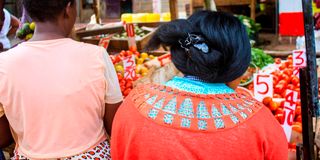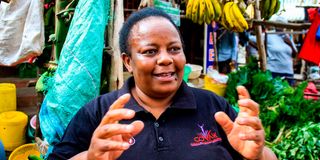'Sex for business protection:' Women traders recount Nairobi's living hell

Josephine Atieno* and Doreen Wanja*, who are victims of sexual violence, at a stall on January 10, 2024.
What you need to know:
- Many of them suffer in silence at the hands of rogue market officials with deep-seated sexist attitude.
- Also accused are middlemen who connect them to farmers from whom they buy produce.
We are seated in a stall belonging to Doreen Wanja*, a woman in her 50s who has been a greengrocer for decades.
She operates in one of the public markets in Nairobi. It is minutes past midday, so she has a few customers to attend to.
“I woke up at 4.30am today because the truck bringing my products from West Pokot arrived in Nairobi earlier than I expected.
"Depending on what is available, I usually source lemons, pumpkins, avocados and mangoes and resell,” she says.
As she rearranges her mangoes, we are joined by one of her friends, Josephine Atieno*, who is also a greengrocer. She is also in her 50s and has been in the same market for the past two decades.
Atieno tells Nation.Africa that during dry seasons, supplies reduce and they have to source fruits and vegetables from as far as Uganda.
Wanja says, “The trucks arrive in Nairobi at different times. It could be as early as 6am or as late as 1am. We usually have to pay county taxes for each truck that enters the market.
"The officers are always at the gate. We also pay the market officials Sh100 and some local young men Sh100 for ‘protection.’”
Although the two acknowledge the importance of paying taxes, they cannot understand why they have to pay protection fees. This has been the source of their predicament: sexual violence.
They say victims choose not to speak up for fear of reprisal.
“If you don’t have money, the men (market officials and some local men) will demand to have sex with you to waive the payment.
"Sometimes they will block the path so that the truck cannot get into the market.
"Last year, I didn’t have enough money to pay for a couple of trucks that had brought my goods to the market; they tried to rape me,” Wanja reveals.
Wanja recounts the events of that day when she had tried hiding from the men. However, at around 9pm, one of the market officials cornered her into one of the stalls.
“Wewe Wanja leo utanifanyia hivyo (You will have sex with me today, Wanja),” she quotes one of the men as having told her.
“He was about to flip me over when a lorry drove into the market and shone its headlights on us. He had been exposed and quickly ran away.”
Wanja adds that at times, the officials threaten them with crude weapons such as knives.
“I know the young man very well. I even know his wife and family, but I cannot report him because they will target and destroy my business. This is my only livelihood.
"If I were to report him, I would have to leave this market,” Wanja says.
Middlemen
Even when sourcing goods at various farms across the country, the women say they still get sexually assaulted.
Atieno, who usually gets her fruits from Machakos County, tells Nation.Africa that the middlemen sometimes ask for sex to introduce them to farmers who want to sell their produce.
“Even when you have paid them for their services, which is usually Sh2,000, they may refuse to load the sacks of produce onto your truck unless you have sex with them.
"If you reject their demands, you will stay with your luggage on the farm for so many hours before getting help to load the produce,” she reveals.
Joyce Mwangangi, a paralegal working with women traders, confirms that Nairobi market officials are notorious perpetrators of violence.
“Because the traders have to pay a daily rental fee of Sh100 for their stalls and a fee for every truck that brings in their produce, the men have a lot of power over them,” Ms Mwangangi says.
“The officials are very powerful and have the ability to even negotiate with middlemen who bring produce to the market.
"At times the women traders are asked to have sex with them so that their debts with the middlemen can be waived.”

Joyce Mwangangi, a paralegal, during an interview at a Nairobi market on January 10, 2024.
Consequently, the women have no one to turn to for help. They are cornered at multiple points of harassment throughout their business.
Ms Mwangangi collects information about harassment and reports to police officers.
“I also encourage them to use toll-free numbers ran by organisations such as the Coalition on Violence Against Women (Covaw) when they experience harassment,” she says.
However, Khadija Tsuma, a police officer at the Kariobangi North Gender Desk, says that even though they receive complaints from paralegals such as Ms Mwangangi, they cannot start investigating cases without a formal complaint from the victim.
“They (victims) should be courageous and make a decision to report the perpetrator and be willing to go through the court process of prosecuting the matter. Without their complaints, the case against such perpetrators is weak.
"Even though this may threaten their livelihood, it is the only way to access justice,” Ms Tsuma tells Nation.Africa.
Dr Anne Gachiri, a gender expert, classifies the abuse as economic gender-based violence.
“Abuse against women traders has been sanitised. In fact, some traders would even advise the women to give in to the demands so that they can operate their businesses peacefully.
"This emboldens the perpetrators to keep harassing such women,” Dr Gachiri explains.
She adds that the women traders are more vulnerable than most other working women because they are low-income earners.
As such, society does not see them as victims because they are expected to yield to such demands.
Study findings
Her assertions are corroborated by a 2020 paper published by UN Women on “Harassment in the Informal Economy: Farm workers and Domestic Workers”.
It established that the informality of any trade presents challenges such as reliance on verbal and precarious agreement, unsafe working environments and excessively long hours.
Thus women, who make up the largest portion of workers in the informal economy, experience discrimination exhibited in many ways such as harassment.
Nation.Africa spoke with Roselyn Mukabana, county anti-GBV campaign coordinator, on the matter.
She said the city has a gender working group that includes business leaders, but her office has not received any reports of harassment.
When asked where the affected women would seek recourse as most of them are too intimidated to report the perpetrators for fear of retaliation, Ms Mukabana responded that they should reach out to her.
Meantime, her office has launched investigations.
On Monday, she said she was waiting for the outcome of the investigations to help them take action and hold the culprits to account.
A recent study conducted by Covaw on economic exclusion of women involved informal business in Nairobi found that one of the major challenges faced by women in informal businesses is harassment.
The violence is further exacerbated by lack of electricity as 80 per cent of informal businesses cannot access it.
“While economic independence does not shield women from violence, access to economic resources can enhance women's capacity to make meaningful choices.
"The violence women face keeps them poor in part because their poverty inhibits their ability to find solutions,” the report says.
Further, a 2020 study, “Exploring Prevalence of Harassment within the Informal Sector in Kenya” published by Hivos East Africa, found that the average prevalence of harassment was 47 per cent.
The majority of victims are women at 58 per cent, while the men had a lower prevalence of 35 per cent.
The study also found that 68 per cent of participants reported occurrence of harassment in their working area.
Sometimes, this harassment would occur outside the working areas, which was not within the authority of the business owners or could not be witnessed by colleagues.
Meanwhile, for Wanja and Atieno, their agony is worsening with every passing day.
They now want Nairobi County, through its Trade Department, to have independent gender desks within the market where such cases can be addressed without survivors having the fear of being stigmatised.
Hurdles on the road to justice
While formal workplaces enjoy structured systems and institutions that address sexual harassment, lawyer Riziki Emukule explains that the informal economy does not enjoy the same privileges.
“The Employment Act, 2007, strictly mandates organisations to formulate and implement a sexual harassment policy and a strategic plan to prevent such misconduct in their workplaces.
"All employees are also required to be informed of the policy and sensitised to what the document entails,’” she says.
In such places, victims and survivors of sexual harassment can use internal mechanisms such as reporting to their disciplinary boards and even move to court if they’re still not satisfied.
However, in the informal economy, that is not possible.
Ms Emukule notes that even though such women may organise themselves in self-help groups or be working with community-based organisations, there is still little room for accountability.
She says the women are an amorphous group that is not under any institution.

Lawyer Riziki Emukule. She says women working in the informal sector have little remedy in the current legal framework and have sexual violence survivors to file a class action suit.
“The mechanisms for redress for such women are also not watertight. There is no employer to hold to account because they are self-employed.
"Although women are protected under various provisions of the Constitution, you will only find that only highly publicised or gruesome cases will be reported. Most cases will slip through the cracks.”
She goes on to explain that litigation can be quite lengthy and expensive. The survivor will be required to attend court appearances at the disadvantage of her work, which she uses to earn daily wages.
Further, the process is also evidence-based and it is difficult to gather evidence from informal work areas.
“Who will stand up as your witness? Do fellow traders even have time to attend court? There is also an inherent fear and mistrust of the law because the perpetrators are in positions of power in such markets.”
Even though she lauds specialised sexual and gender-based violence courts, she still notes that there are only three such courts in Kenya and they are not accessible to many women working in informal sectors.
Victim protection
The Victim Protection Act seeks to protect victims of any offence and offers remedies.
“Ideally, the provisions of the Victim Protection Act, 2014, should assist such women to have access to safe houses and provide psychosocial support. However, such institutions lack the capacity to cater to all arising cases.”
Therefore, in case survivors of sexual harassment in the informal sectors want to pursue legal redress, Ms Emukule advises them to present a joint complaint as a class action.
She emphasises that “there is power in numbers.”
*Names of the victims have been changed to protect their identities.





